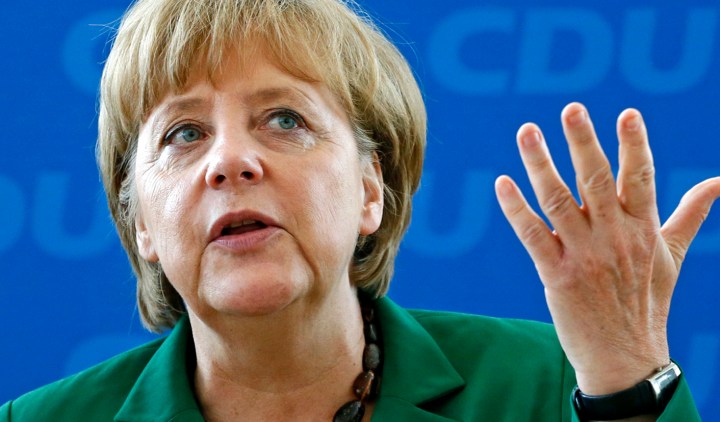Newsdeck
Risk, history shape German view on Europe referendum

"Do you, German men and women, endorse this policy of your Reich government, and are you ready to express, of your own free will, that you will solemnly commit yourself to it?" By Stephen Brown.
An undercurrent of menace in the wording of the Nazis’ 1933 referendum to leave the League of Nations – ratified by 95 percent of voters – and the abuse of plebiscites in the Weimar Republic explain a lingering unease in Germany about national referendums.
But seven decades on, Finance Minister Wolfgang Schaeuble has put the cat among the pigeons by saying it is time for a vote on further integration into Europe, a n d opinion polls suggest the public is behind him.
So far, with the sometimes qualified consent of the Federal Constitutional Court, Germany has ceded powers to Europe and agreed bailouts for struggling euro zone partners without explicit consent from voters, but the region’s stubborn debt crisis has thrown up ever more demands for concessions to EU institutions.
“We didn’t have a referendum when we gave up the deutsche mark, so I can’t believe we’ll have one to make the ESM (European Stability Mechanism) happen – unless we need a new constitution, of course,” said politics professor Tanja Boerzel in Berlin.
Referendums remain a tough sell for many German politicians, Chancellor Angela Merkel chief among them.
Conveniently for Merkel, Germany’s “Basic Law” only permits a national referendum in the extreme circumstances of reshaping borders or drawing up a whole new constitution.
While referendums by federal states are common – such as Bavaria’s 2010 decision to ban smoking at the Oktoberfest – changing the constitution to permit a national referendum would require two-thirds majorities in the Bundestag lower house of parliament and the Bundesrat upper house.
This is a high hurdle at the best of times, as Merkel has found for votes affecting sovereignty during the euro zone debt crisis, and can only get tougher as federal elections approach in 2013.
Schaeuble provoked the debate by saying a referendum would “come more quickly than I would have believed”. While the two biggest political parties – the ruling Christian Democrats (CDU) and opposition Social Democrats (SPD) – are cool toward it, Merkel’s smaller coalition partners like the idea, in principle at least.
In a Deutschlandtrend poll this month, 71 percent of Germans polled wanted a direct vote on whether more powers – especially over the budget – should be ceded to EU authorities in Brussels.
Merkel’s spokesman, careful not to tread on Schaeuble’s toes, said this was a question for “uebermorgen” (the day after tomorrow), not for now.
More than half of those polled opposed changing the constitution to save the euro, giving up budget powers or creating a “United States of Europe”, which stands in stark contrast to Merkel’s mantra of “more Europe” as the answer to the region’s debt crisis.
BACK TO THE PEOPLE
The decision may be partly taken out of politicians’ hands by the Constitutional Court, which is keeping Europe on tenterhooks until Sept. 12, when it will rule on whether Germany can legally ratify the ESM, a permanent bailout scheme, and the fiscal pact, an agreement on budget discipline across Europe.
So far in the sovereign debt crisis, the court in Karlsruhe has okayed bailout deals for fellow euro zone nations such as Greece but has wagged a finger at the government for not adequately consulting the Bundestag.
It may just do the same in September – but if it does reject the ESM and fiscal pact, or signal very strongly that the Basic Law has been stretched as far as it can and that further EU integration needs constitutional change, a referendum might be on the cards.
“The court can’t order a referendum. All it can do is say the constitution does not allow Germany to go any further. Then it is up to politicians to decide whether to forget the treaty or, if they deem further integration inevitable, ask the people,” said one senior judicial source.
Schaeuble, a leading figure in previous drives for European integration in the era of former chancellor Helmut Kohl, w ants the fullest possible democratic legitimacy for far-reaching reforms that would lead inexorably to a federal Europe.
This puts him in the unlikely company of eurosceptics and the hardline Left, who see a referendum as the best way of going in the opposite direction and collapsing the whole euro project.
Thilo Sarrazin, a former central banker and author of the best-seller “Europe Doesn’t Need the Euro”, sees a referendum as a platform for eurosceptics like himself, who are otherwise reduced to shouting from the political sidelines.
He would like the Constitutional Court to rule in September that “parliament gets its right from the people and can stretch its rights only so far, and at a certain red line has to go back to the people and lay this question before the people”.
But even Sarrazin warns of the risk of demagogues hijacking a direct vote, at a time of fragmentation in the party political system when mavericks such as the Pirates and eurosceptics such as the Bavarian Free Voters have their sights on the Bundestag in 2013.
Bavaria’s ruling Christian Social Union (CSU), sister party to Merkel’s CDU, confront the Free Voters in a state election in 2013. Though long champions of referendums, the CSU thinks they should only be introduced nationwide after lengthy discussion.
RISK OF A “NO”
Likewise, the CDU/CSU’s junior coalition partners the Free Democrats (FDP) are in favour of referendums, but the party’s second-in-command Patrick Doering has tempered that enthusiasm.
“It would require a change in the Basic Law, and this is a debate we favour. I am a bit sceptical about whether now is the right time for testing out a plebiscite on the complexities of the European Union,” he said.
Merkel aides say she is extremely unlikely to take such a risk before the 2013 elections, when on current form she would win a third term. The same polls that voice discontent with the euro reflect confidence in her leadership and a belief that she is better equipped to handle the crisis than the SPD.
Despite resistance in the Bundestag from a hard core of up to two dozen centre-right backbenchers who routinely rebel on euro votes, Merkel got two-thirds approval on the ESM less than a month ago thanks to the SPD, whose pro-European credentials have kept them onside.
When the chancellor promised to turn the 2013 elections into a vote on Europe, SPD chief Sigmar Gabriel responded vigorously with “Let’s do it!”
This may be a bid by Merkel to get direct legitimation for political and fiscal integration in Europe from the people, but without the inherent risk of single-issue referendums, which elsewhere in Europe have tended to mobilise the “No” vote.
“The risk is, from the point of view of governments, that referendums very often give a negative majority,” said German law professor Ulrich Battis.
Beyond 2013, the pragmatic Merkel might accept a direct vote on Europe, and if she headed a “Grand Coalition” with the SPD as in her first term, the parliamentary obstacles would be easier.
EU integration might then have to halt at every step for a Bundestag vote or German referendum, bogging down a decision-making process that financial markets already consider agonisingly slow, thanks to Germany’s parliament and top court.
But, as one German official put it, “That’s democracy”. DM
Photo: Angela Merkel (Reuters)


















 Become an Insider
Become an Insider